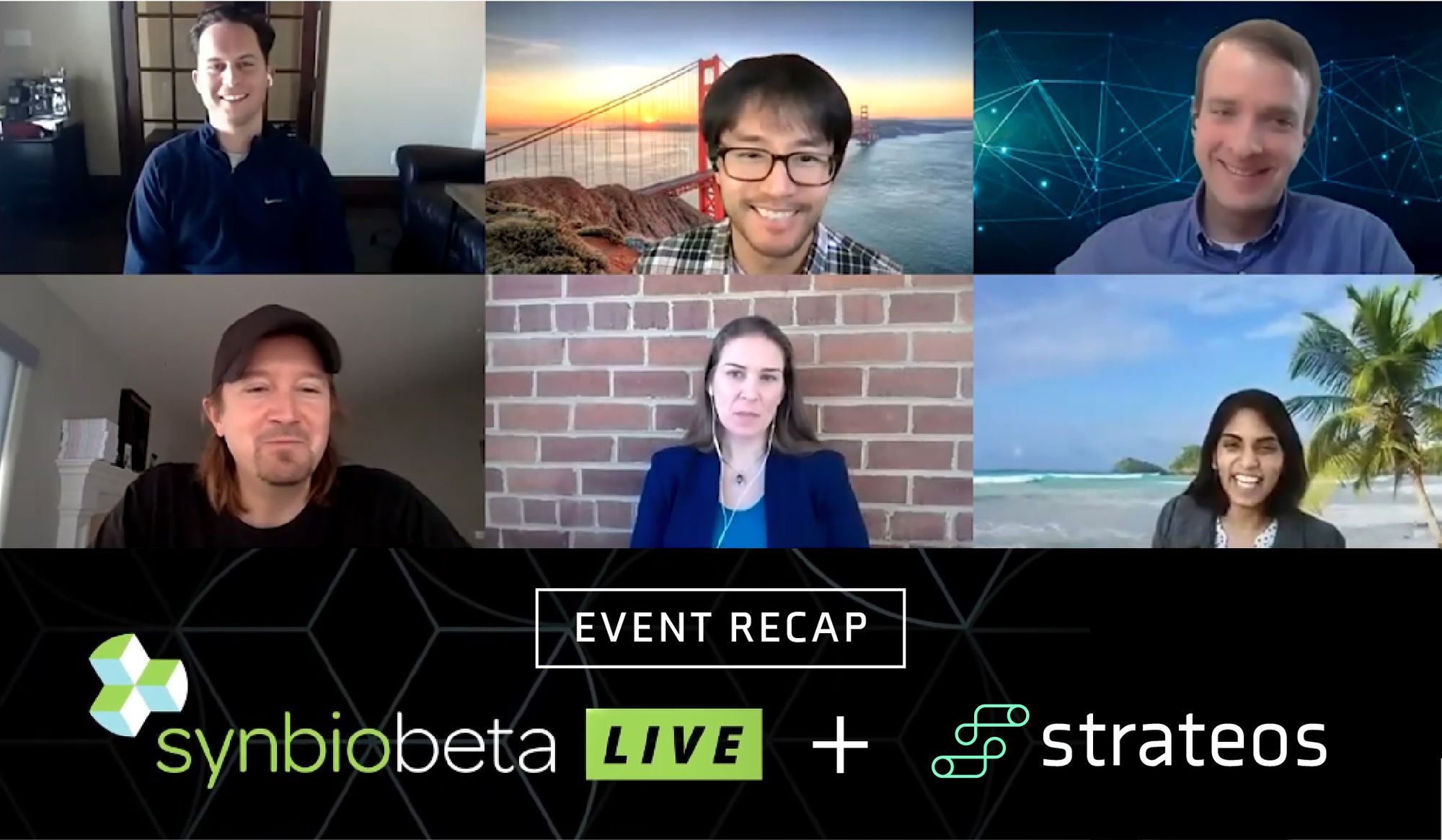SynBioBeta Live: Lessons Learned in Prototyping the Internet of Synthetic Biology - Webinar Recap

Strateos was pleased to host a live round table discussion with SynBioBeta on February 24, 2021: Lessons Learned in Prototyping the Internet of Synthetic Biology. The panel of experts discussed current bottlenecks and recent advances in synthetic biology and how AI, software tools, automation, and high-throughput robotics are being utilized to create a unified, intelligent closed-loop approach to experimental design, execution, and data analysis to accelerate scientific discoveries.

Strateos is a Leader in Design-Build-Test-Learn Loop Optimization for Synthetic Biology
The panel’s interdisciplinary group of scientists, software developers, automation specialists, and machine learning experts was brought together by the Synergistic Discovery and Design (SD2) program, funded by DARPA, aimed at developing data-driven methods for robust design in domains that lack high-fidelity models like synthetic biology. SD2 seeks to develop tools like AI methodology and high throughput automation to enable robust design and create cloud-based open data exchange for research communities.
The goal is to develop a closed Design-Build-Test-Learn experimental loop for synthetic biology applications to enable scientists to iterate experiments quickly to reach scientific answers faster. The team sought to create a data-driven platform with integrated software tools enabling scientists to upload experimental designs built upon computational models, execute experiments using cloud-based automation, and analyze digital data outputs in a high throughput manner to inform decisions. These various aspects of the experimental loop were divided into portions among the expert teams to optimize with the aim of creating a unified workflow that bridges geographical divides. With large consortium collaborations, it is necessary to consider how we talk about science and how best to transmit that information from group to group in a format that is consistent and accurate. These same experimental formalizations allow automated cloud laboratories like Strateos to efficiently process scientific requests and inform and record automated execution routes back to scientists around the world.
“Strateos works at the intersection between science, automation, and software and really thinks about how we can use software tooling and a software mindset to accelerate scientific discovery.” - Peter Lee, Director of Science & Technology at Strateos
From the Benchtop to the Cloud
Complex biological systems are heterogeneous and unpredictable and require a consortium of expertise and technologies to decipher. Difficulties in investigating these systems are compounded by siloed knowledge, geographic barriers, and disparate information across labs in experimental design, execution, data sharing, and analysis.
But, how can we get everyone to speak the same language?
The first step is to identify the main bottlenecks in the workflow. Steve Haase from Duke University outlined some of the main challenges in benchtop science where innovations are needed to accelerate the experimental loop. Not only is biology inherently variable, but the highly manual nature of the work and the differences lab-to-lab in protocols and reagents are impediments to increasing throughput and make it difficult for meaningful data comparison. To achieve normalization across labs, there is an unmet need for protocol sharing, data standardization, and onboarding at labs in different geographical locations in a more automated fashion. As Diveena Becker from Ginkgo Bioworks stressed, lack of metadata from conventional non-automated methods is a significant bottleneck in providing the context needed to draw downstream R&D conclusions.
Strateos is a Key Component of Scientific Collaboration
As the SD2 program has progressed, the experimental Design-Build-Test-Learn loop has become increasingly automated. Strateos’ Automated Cloud Laboratories have been key to running experiments autonomously and remotely, freeing up the scientists to focus on more critical aspects of the workflow like data analysis to parse information collected from automated systems and experimental design to send new experiments to automated systems.
“We are automating out those little basic bits, and we’re letting the humans bring in their subject matter expertise, diagnose what’s going on here, design the next phase of the experiment, get that loop turning faster and faster so that we can do better science. Strateos’ ability to run these experiments at scale has been critical to that.” – Mark Weston, Co-Founder & CEO of Netrias
The holy grail of synthetic biology is being able to model biological systems with a fair degree of accuracy in the digital space before running physical experiments. The inclusion of AI and machine learning in metadata and data harmonization in the SD2 program has made great strides in this area. Better understanding of why some designs succeed and others fail helps refine designs and build higher-fidelity models. Pivotal to creating those models is the generation of clean, actionable data like that generated by Strateos’ automated infrastructure.
To increase interorganizational experimental compatibility, Strateos is participating in the Common Protocol Representation initiative within the SD2 program. As Peter explained, the focus is on creating interoperable standards so that benchtop protocols from any lab can be interpreted and converted into a common language for use on standardized platforms to harmonize data generation.
Ultimately, the interdisciplinary team participating in SD2 hopes to extend the learnings from this program to facilitate the creation of high-fidelity models in other complex scientific domains like drug discovery and small molecule synthesis to accelerate scientific discovery. The panel discussion showcased the collaborative effort behind the SD2 program and the goals that can be achieved on an interorganizational scale.
For more information or a demonstration of Strateos’ capabilities, contact sales@strateos.com
